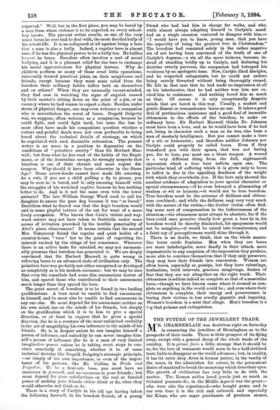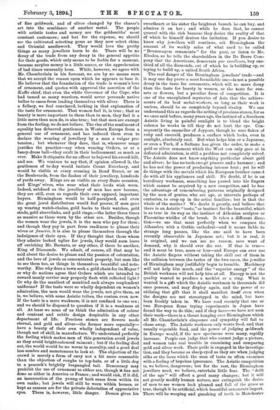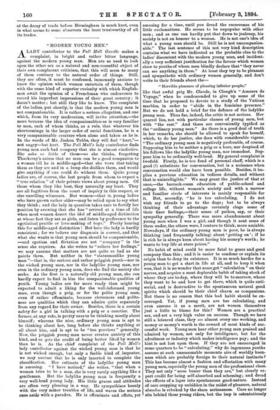THE FUTURE OF THE JEWELLERY TRADE.
MR. CHAMBERLAIN was doubtless right on Saturday in reassuring the jewellers of Birmingham as to the prospects of their trade. There is little prospect of its dying away, except with a general decay of the whole trade of the country. It is prima facie a little strange that it should be so, for the love of ornament would seem to be a half-civilised taste liable to disappear as the world advances ; but, in reality, it has its roots deep down in human nature, in the vanity of the sexes, in the admiration for colour, in the permanent desire of mankind to break the monotony which tires their eyes. The growth of civilisation has very little to do with the matter. The Roman nobles loved jewels just as much as Oriental peasants do; in the Middle Ages it was the great— who were also the experienced—who bought gems, and in our own time it is the rich and cultured, and especially the Kings, who are eager purchasers of precious stones, MR. CHAMBERLAIN was doubtless right on Saturday in reassuring the jewellers of Birmingham as to the prospects of their trade. There is little prospect of its dying away, except with a general decay of the whole trade of the country. It is prima facie a little strange that it should be so, for the love of ornament would seem to be a half-civilised taste liable to disappear as the world advances ; but, in reality, it has its roots deep down in human nature, in the vanity of the sexes, in the admiration for colour, in the permanent desire of mankind to break the monotony which tires their eyes. The growth of civilisation has very little to do with the matter. The Roman nobles loved jewels just as much as Oriental peasants do; in the Middle Ages it was the great— who were also the experienced—who bought gems, and in our own time it is the rich and cultured, and especially the Kings, who are eager purchasers of precious stones,
of fine goldwork, and of silver changed by the chaser's art into the semblance of another metal. The people with artistic tastes and money are the goldsmiths' most constant customers; and but for the expense, we should see the cultivated selecting gems as they now select china and Oriental needlework. They would love the pretty things as many jewellers learn to do. There will be no decay of the trade from any decay in the general appetite for their goods, which only seems to be feeble for a moment, because surplus money is a little scarce, or the apprehension of bad times unusually keen. While, however, we agree with Mr. Chamberlain in his forecast, we are by no means sure that we accept the reason upon which he appears to base it. He believes that the foundation of the trade is women's love of ornament, and quotes with approval the assertion of the Kaffir chief, that even the white Governor of the Cape, who had tamed so many warriors, would never persuade native belles to cease from loading themselves with silver. There is a fallacy, we feel convinced, lurking in that explanation of the taste for ornament. That women feel it, is true ; that as beauty is more important to them than to men, they feel it a little more than men do, is also true; but that men are exempt from the feeling, we do not believe. The rise of the sentiment of equality has debarred gentlemen in Western Europe from a general use of ornament, and has induced them even to declare the wearing of jewellery by a man a vulgar pre- tension ; but whenever they dare, that is, whenever usage justifies the practice—say when wearing Orders, or at a fancy-dress ball—they exult in their bedizenment as much as ever. Make it etiquette for an officer to bejewel his sword-hilt, and see. We venture to say that, if opinion allowed it, the gentlemen of to-day would imitate Count Esterhazy, and would be visible at every crossing in Bond Street, or on the Boulevards, from the flashes of their jewellery, hundreds of yards away. Kings are so visible on every State occasion, and Kings' wives, who wear what their lords wish worn. Indeed, subdued as the jewellery of men has now become, they are still, even as regards their own apparel, important buyers. Birmingham would be half-paralysed, and even the great jewel distributors would feel poorer, if men gave up wearing watch-chains, gold backs to their watches, gold studs, gold sleevelinks, and gold rings,—the latter three times as massive as those worn by the other sex. Besides, though the women wear the jewels, it is the men who pay for them ; and though they pay in part from readiness to please their wives or fiancées, it is also to please themselves through the indulgence of their eyes. If they thought that those whom they admire looked uglier for jewels, they would soon leave off enriching Mr. Barnato, or any other, if there be another, King of Diamonds. We admit, of course, all that may be said about the desire to please and the passion of ostentation, and the love of jewels as concentrated property, but men like to see them too, as things in themselves beautiful and note- worthy. Else why does a town seek a gold chain for its Mayor? or why do nations agree that Orders which are intended to reward manly service may properly flash with reflected light? Or why do the manliest of mankind seek always resplendent uniforms? If the taste were so wholly dependent on women's admiration, the men would wear the jewels, not give them, as is, we believe, with some Asiatic tribes, the custom even now. If the taste is a mere weakness, it is not confined to one sex; and we should be disposed to question if it is a weakness at all. At least we none of us think the admiration of colour and contrast and subtle design despicable in any other department of life. Precious stones are flowers made eternal, and gold and silver—the former more especially— have a beauty of their own wholly independent of value, though not of skill, in manufacture. We understand perfectly the feeling which makes men of this generation avoid jewels as they avoid bright-coloured raiment ; but if the feeling died out, the world would be no worse in morality, and a good deal less sombre and monotonous to look at. The objection of the crowd is merely a form of envy not a bit more reasonable than the objection of roughs to top-hats, or of a little dog to a peacock's brightly bespangled tail. Democracy may prohibit the use of ornament to either sex, though it has not done so either in America or France; and would risk, if it did, an insurrection of the young of both sexes from within its own ranks; but jewels will still be worn within houses, or kept as cameos are for the private delectation of appreciative eyes. There is, however, little danger. Demos gives his sweetheart or his sister the brightest brooch he can buy, and admires it on her ; and while he does that, he cannot quarrel with the rich because they desire the reality of that of which he himself desires the imitation. If you desire to know why jewellers will continue, ask Birmingham the amount of its weekly sales of what used to be called "Brummagem ornaments" for the poor, or listen to Mr. Rhodes, as he tells the shareholders in the De Beers Cora- pany that the Americans, democrats par excellence, buy one- third of all the diamonds, out of which he is building up, or trying to build up, a united South Africa.
The real danger of the Birmingham jewellers' trade—and it may one day prove a most formidable one—is not a possible decay in the taste for ornaments, which will no more decay than the taste for beauty in women, or the taste for sun- sets or flowers, but a peculiar form of competition. It is one of the unexplained mysteries of Asia that the achieve- ments of its best metal-workers, so long as their work is useless, should be so completely beyond rivalry. We can understand this as regards the setting of precious stones, for as we once said before, many years ago, the instinct of a Southern Asiatic living in painful sunlight is to blend the bright colours he works in till they do not hurt the eye. Con- sequently the enameller of Jeypore, though he uses flakes of ruby and emerald, produces a surface which looks, even in sunlight, absolutely cool. But what helps him or a Japanese, or even a Turk, if a Sultana has given the order, to make a gold or silver ornament which the West can only gaze at in defeated admiration, is still a problem not completely solved. The Asiatic does not know anything particular about gold and silver; he has no tools except pincers and a hammer ; and he has not the power of producing intense heat ; yet he will do things with the metals which his European brother cannot do with all his appliances and skill. No doubt, if he is an hereditary workman, something has passed into his fingers which cannot be acquired by a new competitor, and he has the advantage of remembering patterns originally designed by the men of genius, who are apt, at intervals perhaps of centuries, to crop up in the artist families; but is that the whole of the matter? We doubt it greatly, and believe that there is an Asiatic "taste," or instinct for the beautiful, which is as true in its way as the instinct of Athenian sculptor or Florentine wielder of the brush. It takes a different direc- tion—we see that most perfectly when we compare the Alhambra with a Gothic cathedral—and it seems liable to strange long pauses, like the one said to have been recently observable in Japanese art; but it is real, it is original, and we can see no reason, save want of demand, why it should ever die out. If that is true— and it must be true, more or less—and Europe can ever use the Asiatic fingers without taking the skill out of them in the collision between the tastes of the two races, the jeweller of Birmingham may justifiably begin to tremble. Machinery will not help him much, and the "superior energy" of the British workman will not help him at all. Energy is not the quality wanted to produce a necklet or a ring. What is wanted is a gift which the Asiatic workmen in thousands did once possess, and may display again, and the power of so utilising that gift that it shall manifest itself even when the designs are not stereotyped in the mind, but have been freshly taken in. We have read recently that one or two European firms trying experiments in Japan have found the way to do this; and if they have—we have not seen their work—there is a threat banging over Birmingham which all Mr. Chamberlain's eloquence and sympathy will fail to chase away. The Asiatic workman only wants food, and that usually vegetable food, and the power of judging goldwork in Europe would, if the new specimens were many, rapidly increase. People can judge that who cannot judge a picture, and women take real trouble in examining and comparing gold and silver work. Their pride is engaged in the investiga- tion, and they become as sharp-eyed as they are when judging silks or the laces which the man of taste so often examines with a feeling of hopeless ignorance. The Asiatic competition is, we believe, dangerous; but for the rest, the Birmingham jewellers need, we believe, entertain little fear. The "drift of the age" will effect a good many changes; but it will not greatly modify human nature, nor extinguish the desire of men to see women look pleased and full of the graze so true, though it be artificial, which beautiful ornaments impart. There will be weeping and gnashing of teeth in Manchester at the decay of trade before Birmingham is much hurt, even in what seems to some observers the least trustworthy of all its trades.




































 Previous page
Previous page